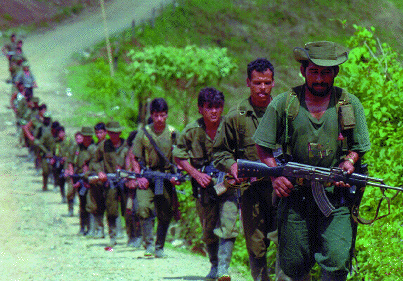UCC justice advocates laud peace agreement in Colombia
The violent conflict in Colombia, which has engulfed the country in a long-running internal struggle since 1964, may finally come to a end. The United Church of Christ is celebrating the announcement of a plan to halt 50 years of violence between the Colombian government and the Revolutionary Armed Forces of Colombia (FARC), as the church has spent almost two decades supporting a peace process in the South American country.
“When I visited Colombia last year, I realized how beautiful this country is. Colombia is rich in culture and natural resources. I admired the work of local churches and community leaders who find ways to respond to the humanitarian crisis caused by decades of armed conflict,” said the Rev. Michael Neuroth, UCC international policy advocate. “Our 24th General Synod called our churches to support the humanitarian and peace work of our Colombian brothers and sisters.”
Part of an international faith community that has called and worked for a just peace in Colombia, the UCC response includes two General Synod resolutions, and UCC missionary Michael Joseph. Different UCC mission groups — many from the Central Atlantic and Connecticut Conference — have visited the country in support of the peace process, to offer spiritual care and to ensure all Colombians are afforded equal human rights.
“Of course there is so much more still to do — peace-building, reconciliation, restorative justice work — not to mention the much needed peace-talks with the ELN,” Joseph said. “Over the past month, we’ve seen an uptick in paramilitary violence and presence around the country, [which is] not unusual with elections just around the corner.”
The warring sides have a framework in place for a final agreement and are expected to hammer out details in the next six months. Guerrilla forces, such as the FARC, will lay down their weapons within two months of that final agreement. Neuroth and his colleagues also praised the pact because it addresses the issue of human rights abuses that occurred during the conflict, with the sides agreeing to provide reparations to victims and to offer amnesty to combatants, expect those who committed war crimes.
“This is great news and we will continue to do what we can to support and raise awareness about this process,” Neuroth said.
Related News
A Prophetic Call for Justice and Peace in Palestine
The executive leaders of the United Church of Christ have issued the following statement...
Read More‘Love is Greater Than Fear’: Regional Youth Events get to the heart of gospel message
United Church of Christ teens attending this summer’s Regional Youth Events (RYE) are...
Read MoreUCC desk calendars available to order now
Prepare for your day, month and year with the United Church of Christ desk calendar —...
Read More


